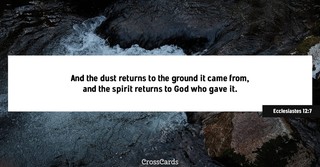- Recent Translations
- All Translations
Prediker 12:3
Share
Settings
Prediker 12:3 Meaning and Commentary
In the day when the keepers of the house shall tremble
By the "house" is meant the human body; which is a house of clay, the earthly house of our tabernacle, in which the soul dwells, ( Job 4:19 ) ( 2 Corinthians 5:1 ) . The Targum interprets the keepers of the house, of the knees and the trembling of them; but the Midrash and Jarchi, much better, of the ribs; man being fenced with bones and sinews, as Job says, ( Job 10:11 ) ; though trembling cannot be well ascribed to them, they being so fixed to the backbone: rather therefore, as Aben Ezra, the hands and arms are meant; which work for the maintenance of the body, and feed it with food, got and prepared by them; and which protect and defend it from injuries; for all which they are fitted, and made strong by the God of nature. The Arabic version renders it, "both keepers"; and, doubtless, respects both hands and arms; and which, in old age, are not only wrinkled, contracted, and stiff, but attended with numbness, pains, and tremor. Some, not amiss, take in the head; which is placed as a watchtower over the body, the seat of the senses; which overlooks, guards, and keeps it, and which often through paralytic disorders, and even the weakness of old age, is attended with a shaking; and the strong men shall bow themselves;
it is strange the Targum and Midrash should interpret this of the arms, designed in the former clause; Jarchi and Aben Ezra, more rightly, of the thighs; it takes in thighs, legs, and feet, which are the basis and support of the human body; and are strengthened for this purpose, having stronger muscles and tendons than any other parts of the body; but these, as old age comes on, are weakened and distorted, and bend under the weight of the body, not being able, without assistance, to sustain it; and the grinders cease because they are few;
the Targum is,
``the teeth of the mouth:''all agree the teeth are meant; only the Midrash takes in the stomach also, which, like a mill, grinds the food. There are three sorts of teeth; the fore teeth, which bite the food, and are called "incisores": the eye teeth, called "canini", which bruise and break the food; and the double teeth, the hindermost, which are called "dentes molares", the grinding teeth; and which being placed in the upper and nether jaw, are like to millstones, broad and rough, and rub against each other and grind the food, and prepare it for the stomach: these, in old age, rot and drop out, and become few and straggling, one here and another there; and, not being over against each other, are of no use, but rather troublesome; and those that look out of the windows be darkened;
the eyes, as the Targum and Ben Melech; and all agree that those that look out are the eyes, or the visive rays: the "windows" they look through are not spectacles; for it is questionable whether they were in use in Solomon's time, and, however, they are not parts of the house; but either the holes in which the eyes are, and so the Septuagint and Vulgate Latin versions render it, to which the Targum agrees, paraphrasing it, the strong bounds of the head; and which are no other than what oculists call the orbits of the eye: or else the eyelids, which open and shut like the casement of a window, and through which, being opened, the eyes look; or the humours of the eye, the watery, crystalline, and glassy, which are transparent, and through which the visive rays pass; or the tunics, or coats of the eye, particularly the "tunica aranea" and "cornea"; as also the optic nerves, and especially the "pupilla", or apple of the eye, which is perforated or bored for this purpose: now these, in old age, become weak, or dim, or thick, or contracted, or obstructed by some means or another by which the sight is greatly hindered, and is a very uncomfortable circumstance; this was Isaac's case, ( Genesis 27:1 ) ; but Moses is an exception to the common case of old men, ( Deuteronomy 34:7 ) .
